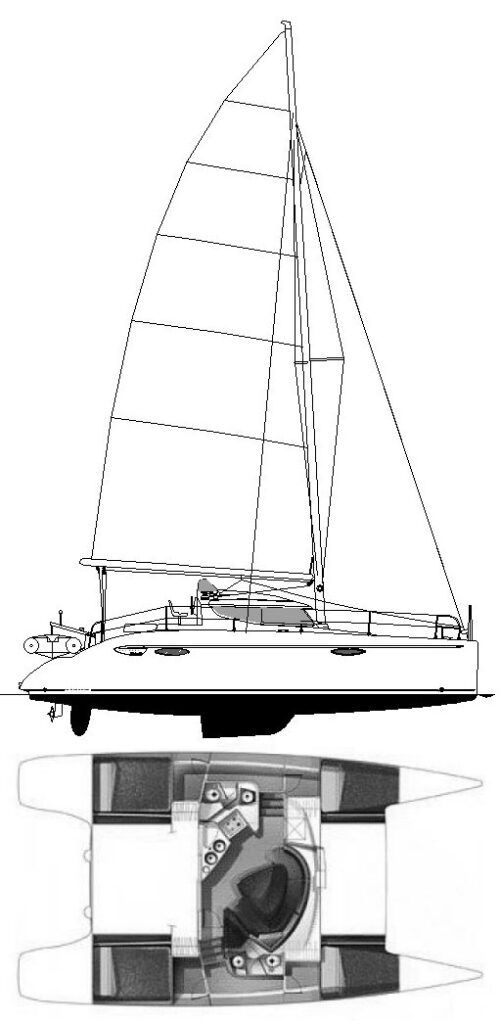The Fountaine Pajot Lavezzi 40, produced from 2002 to 2009, established itself as a highly regarded cruising catamaran, balancing comfortable accommodations with capable sailing performance. Designed by the collaborative efforts of Joubert-Nivelt Design and O. Flahault Design, this vessel quickly became one of Fountaine Pajot's best-selling models, celebrated for its suitability for family cruising and ease of handling. Fountaine Pajot, founded by regatta competitor Jean-François Fountaine in 1976, has built a reputation for crafting multihulls that maximize interior volume, light, and deliver a harmonious blend of performance, comfort, and spaciousness, a philosophy clearly embodied in the Lavezzi 40.
Lavezzi 40 Information, Review, Specs

- Make
- Model
- Number Built
- 227
- Production Year(s)
- 2002 - 2009
The Lavezzi 40 entered production in 2002, building on Fountaine Pajot's growing expertise in cruising catamarans, a strategic shift initiated in the 1980s with models like the Louisiane 37. The design, a collaboration between Joubert-Nivelt Design and O. Flahault Design, aimed to create a comfortable and easily navigable yacht for sea. During this era, Fountaine Pajot was known for its innovative approach to construction, often employing foam-core sandwich techniques to ensure robust yet lightweight structures. The Lavezzi 40's heritage as a "voyaging catamaran" reflects the builder's extensive experience in crafting vessels suitable for extended cruising. Over its production run, a total of 227 units were built. The Lavezzi 40 was offered with two primary interior layout options: a four-cabin version, commonly used for charter, and an owner's version, often referred to as the "Maestro," which dedicated one entire hull to a spacious owner's cabin.
Sailing Performance and Handling
As a cruising catamaran, the Lavezzi 40 is designed for stability and comfort under sail, distinguishing itself from monohulls by its twin-hull configuration and broad beam of 21.4 feet. With a length overall (LOA) of 39.1 feet and an equivalent waterline length (LWL), she offers a substantial platform for offshore cruising. The Lavezzi 40 features a fractional sloop rig with a reported sail area of 969 square feet. This fractional rig design, which typically incorporates smaller headsails, simplifies tacking, making the boat notably easy to handle, even for a single person. Anecdotal evidence suggests the Lavezzi 40 delivers good performance for its class, benefiting from a large sail plan in upwind conditions and a well-thought-out cockpit layout that facilitates maneuvers by keeping Genoa winches clear. Her twin keels and dual rudders contribute to her stability and control, particularly in various sea states.
Accommodations and Layout
The interior of the Fountaine Pajot Lavezzi 40 is well-conceived to maximize comfort and living space, making it a popular choice for both private ownership and charter fleets. The saloon on the bridgedeck is notably spacious, featuring approximately 2 meters (6.56 feet) of headroom, enhancing the feeling of openness and airiness. The interior design commonly utilizes wood finishes combined with white ceilings, contributing to a warm and luminous atmosphere.
As per the specifications, the Lavezzi 40 was available in two main configurations: a four-double-cabin layout, which is prevalent in charter versions, and an owner's version where one hull is dedicated entirely to a larger owner's suite, providing enhanced privacy and comfort. The galley is typically located on the bridgedeck, which is a desirable feature for catamarans, allowing for an open flow between the galley, saloon, and cockpit. While specific details on storage and ventilation require direct inspection, the overall design philosophy of Fountaine Pajot prioritizes maximizing interior volume and light, suggesting ample provisions for both Overview section of builder article.
Owner's Perspectives
Owners of the Fountaine Pajot Lavezzi 40 generally praise its robust construction and comfortable motion, particularly in a seaway, making it a reliable choice for extended cruising and family adventures. The boat is widely regarded as well-developed, benefiting from input from Fountaine Pajot, owners, and dealers. Its innovative design and comfortable amenities are frequently highlighted. While specific recurring issues are not broadly reported, one owner of a 2006 model noted "nothing of consequence" in terms of problems, mentioning only a need to top off the generator battery, suggesting general reliability for its age. The collective viewpoint points to the Lavezzi 40 as a safe and comfortable cruising catamaran, capable of delivering a satisfying sailing experience for those seeking spaciousness and ease of handling.
Measurements
Construction & Hull
- Construction Material
- Fiberglass (Solid)
- Hull Type
- Catamaran Sailboat
- Keel Type
- Twin
- Ballast
- -
- Displacement
- 13228 lbs
- Water Capacity
- 145 gal
- Fuel Capacity
- 66 gal
Engine
- Engine Make
- Volvo Penta
- Engine Model
- MD2030
- Engine Type
- —
- Engine HP
- 36
- Engine Count
- 2
- Drive Type
- —
- Fuel Type
- Diesel
Rig & Sails
- Rig Type
- Fractional Sloop
- P (Main Luff)
- -
- E (Main Foot)
- -
- I (Foretriangle Height)
- -
- J (Foretriangle Base)
- -
- Forestay Length (est)
- -
- Main Sail Area
- -
- Foretriangle Sail Area
- -
- Total Sail Area (Reported)
- 969 sqft
- Total Sail Area (Calc)
- -
Dimensions
- LOA
- 39.1 ft
- LWL
- 39.1 ft
- Beam
- 21.4 ft
- Draft
- 3.6 ft
- Max Headroom
- -
- Air Draft
- 57.58 ft
Calculations
- Hull Speed
- 8.38 kn
- Pounds per Inch Immersion
- —